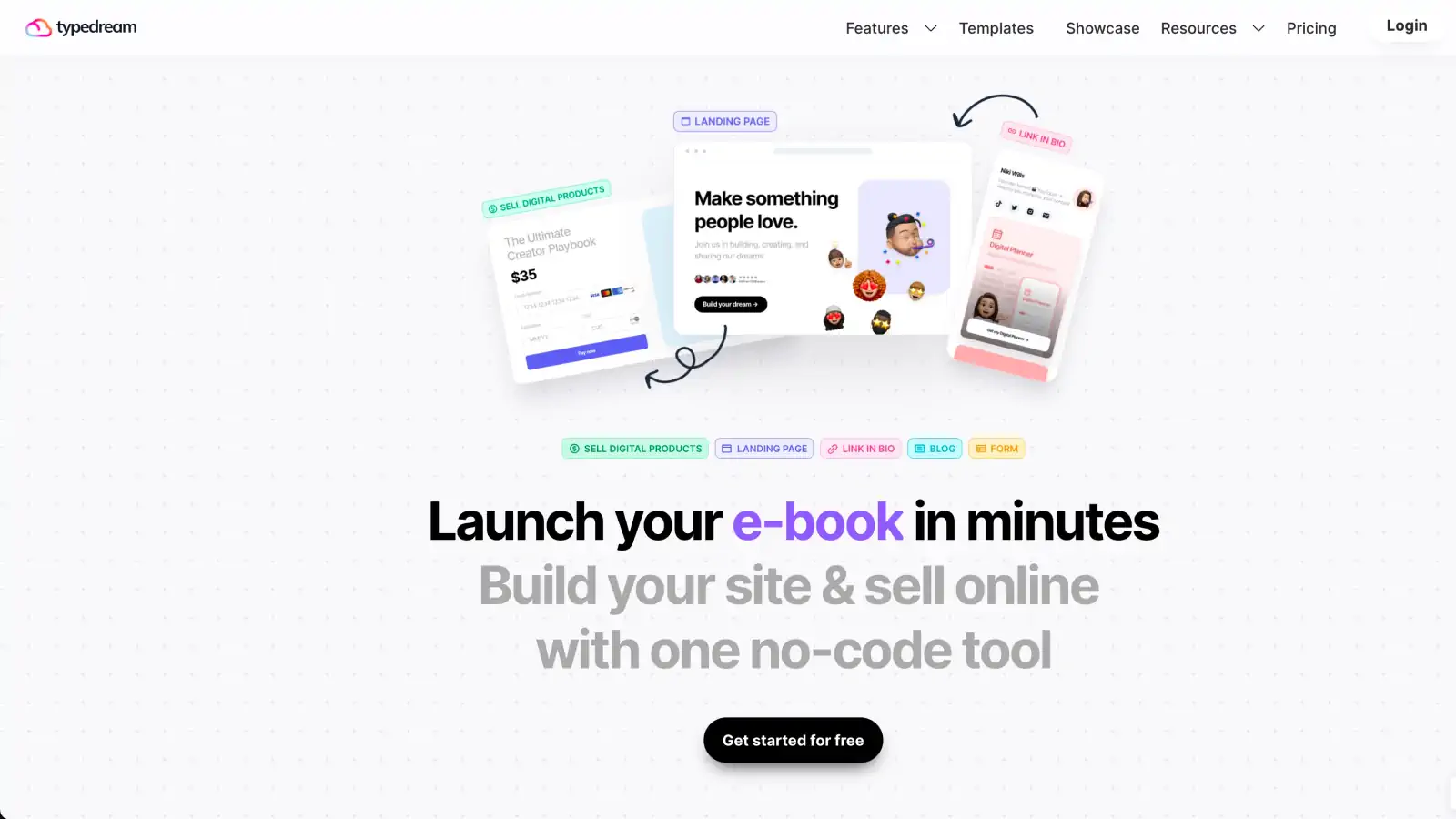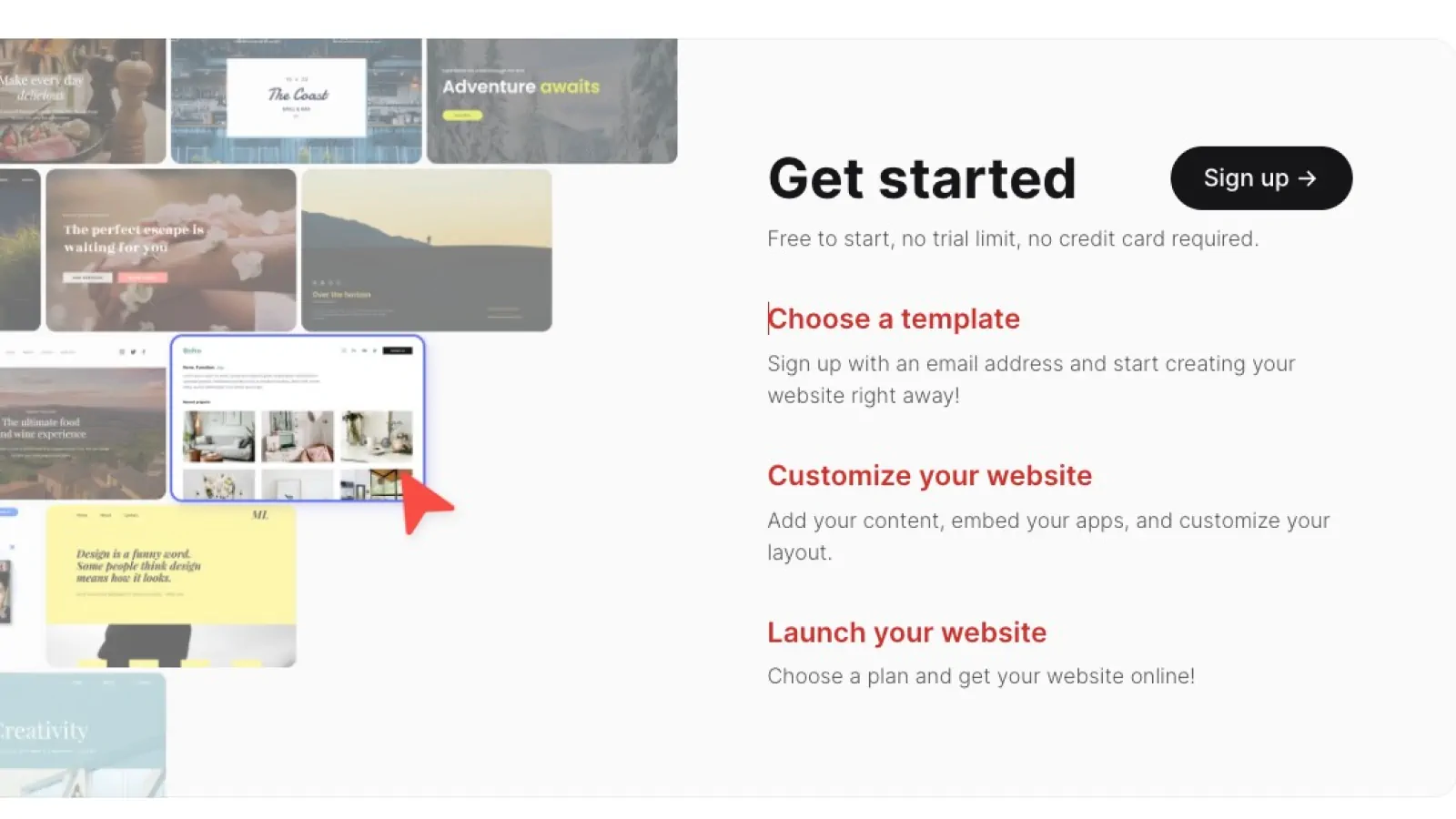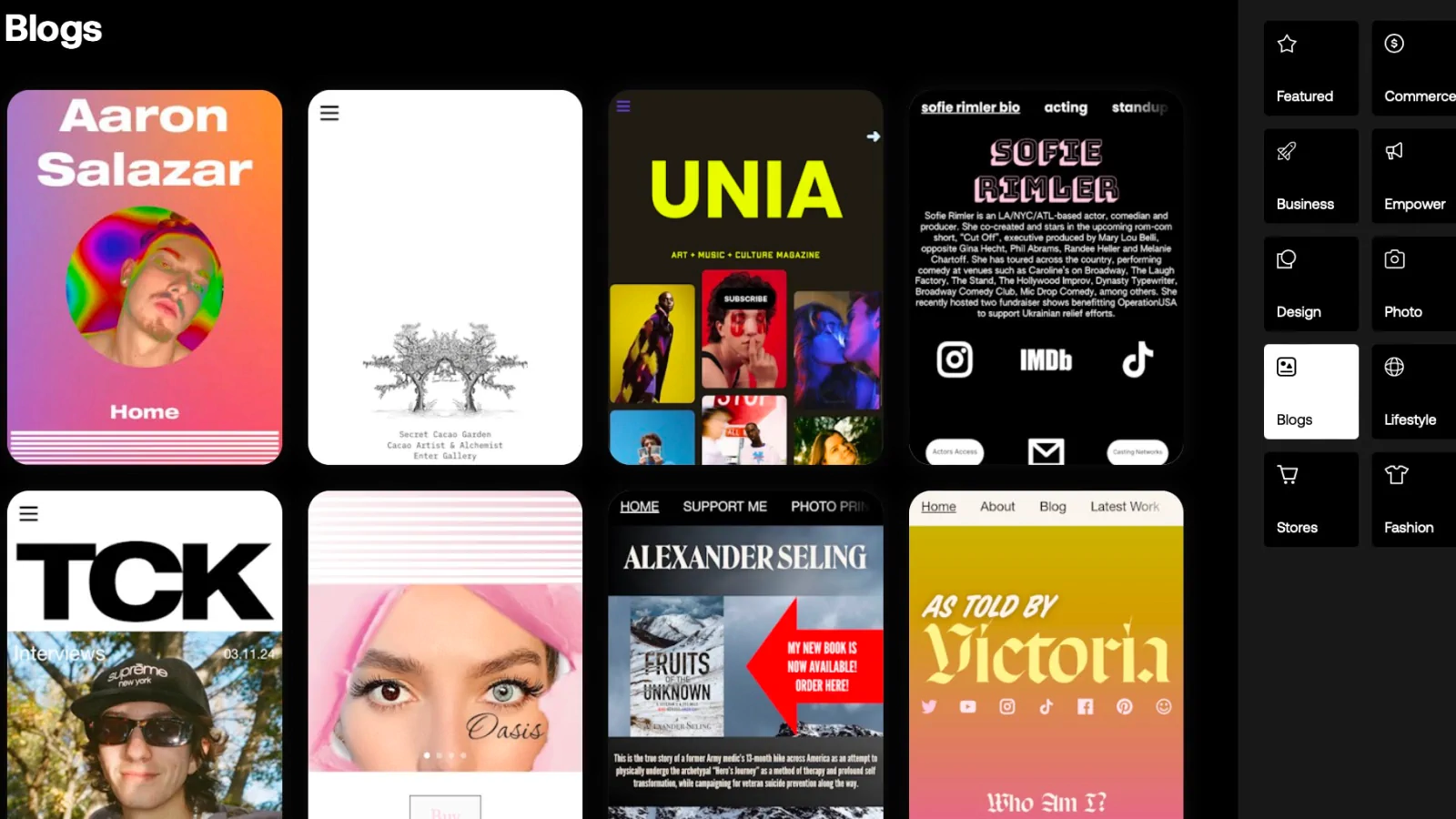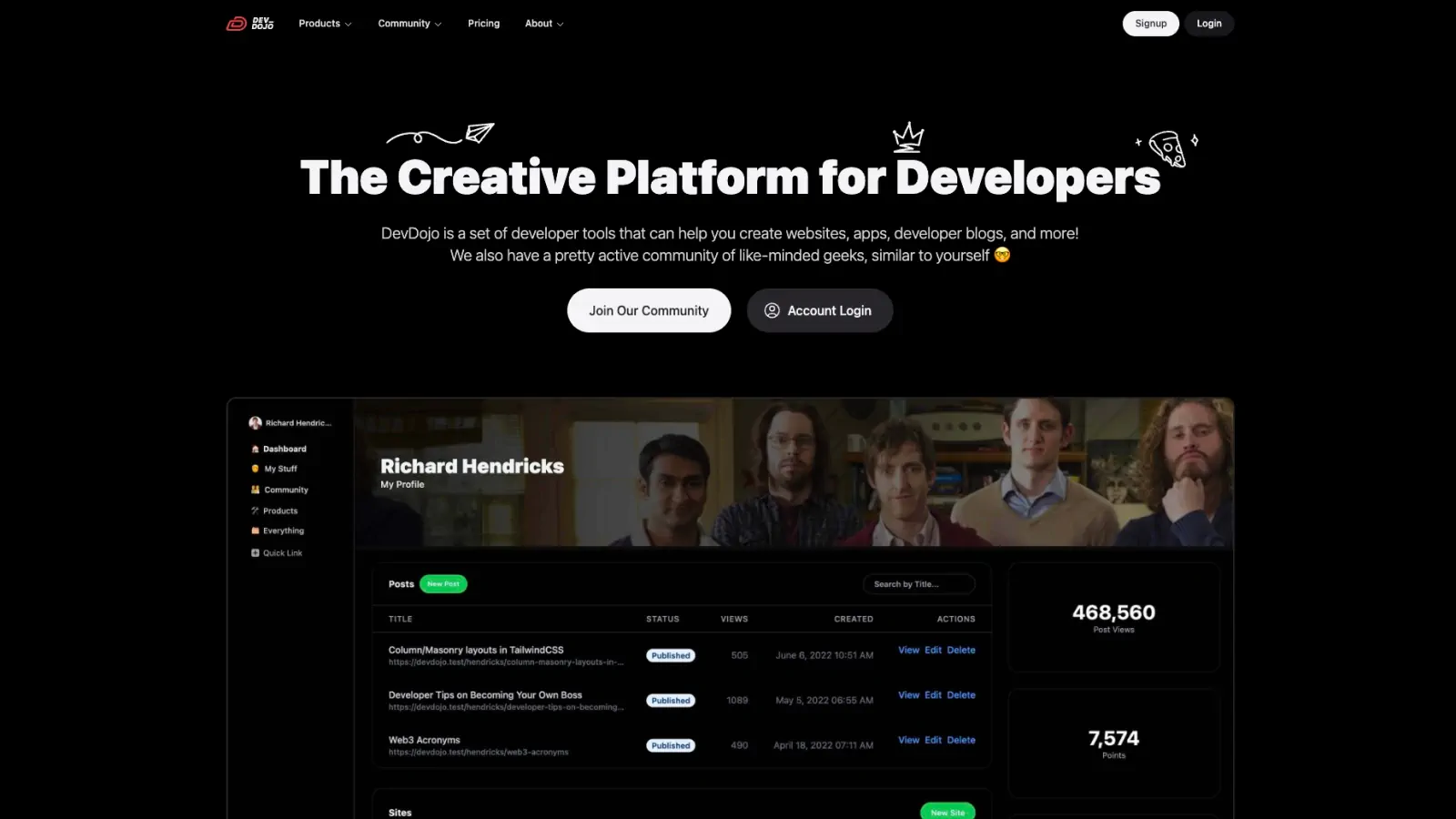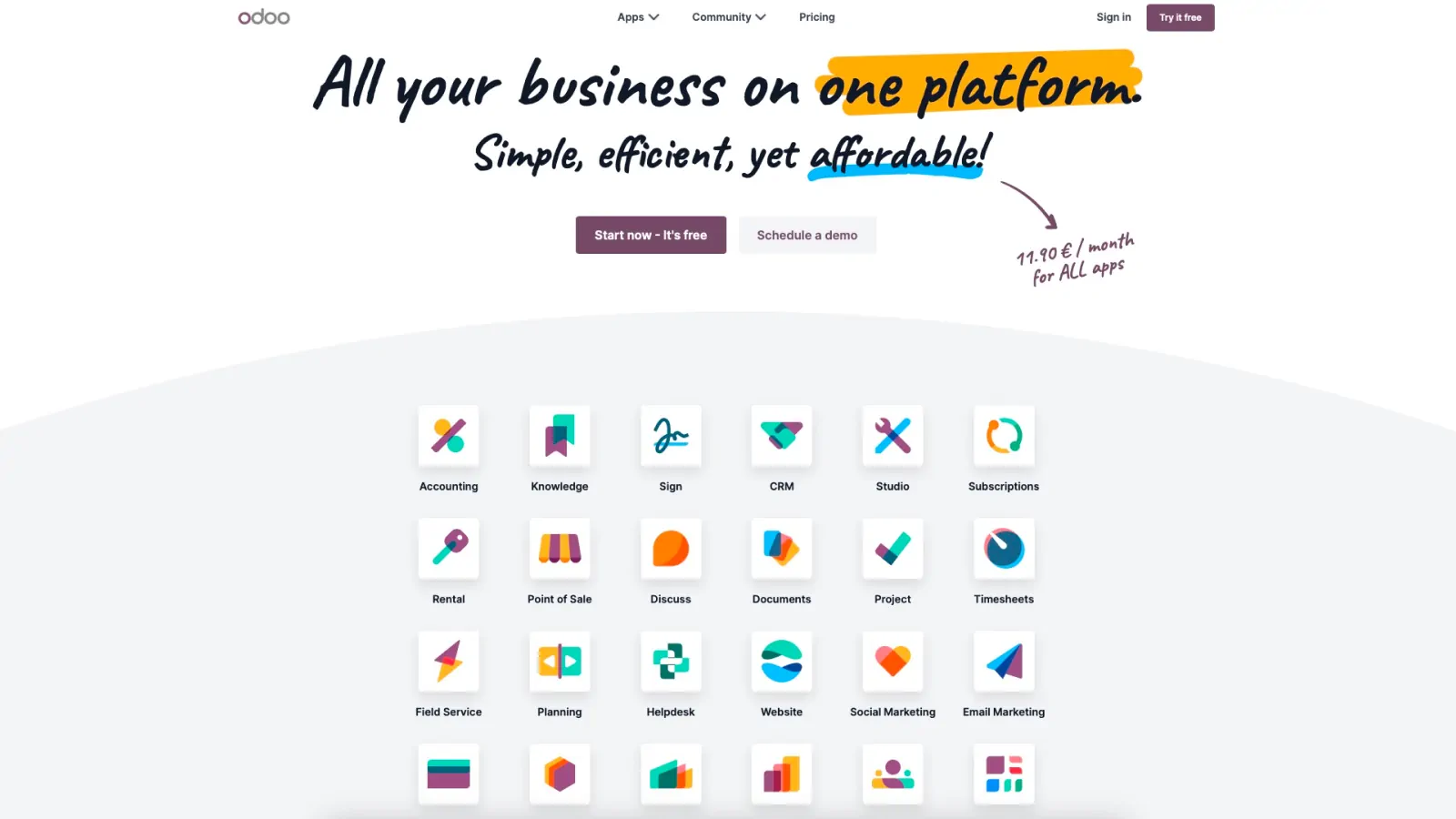Throughout this article, I will discuss the best free blogging platforms. This comprehensive list includes many website builders with blog functionality and free blogging platforms that allow you to use only a subdomain, with your own domain, or use the open-source version.
This guide contains lots of helpful information about different types of free blogging sites. You'll learn about free blogging and easily compare different free blog sites.
What's first on our agenda? I'll explain what a blog is and discuss the connection between blogs and content management systems.
Next, I'll explore why people love to blog.
I'm going to look at the benefits of using free blogging platforms.
And lastly, I'm going to share some of the best free blogging platforms available today.
A) Frequently Asked Questions about Blogging (F.A.Q)

This section covers frequently asked questions and some basic concepts about free blogging.
So let's dive in! First up, what exactly is a blog?
What is a blog?
The word "blog" comes from "weblog". It's like an online diary or information website. It's a place where people or groups can share their thoughts. People can share what they know or tell about their experiences on different topics.
The content in a blog is shown in reverse order generally. This means the newest posts show up first.
What is a content management system?
A content management system (also known as a CMS) is a piece of software that allows you to create, manage and change the digital content on your website.
How do blog sites and CMSs relate to each other?
A CMS allows you to create, manage and modify your website's digital content without specialized technical knowledge. In other words, a CMS is all about content. This content can be user information, the article itself, page information, or product information. If you are using a CMS, the content that is there will need to be somehow transferred to the website. A blog site is the sum of a number of elements, including content. Many blog sites are built on top of a CMS.
Blogging: Why do people do it?
People blog for a variety of reasons, including:
Self-Expression: Blogging allows individuals to express their thoughts, ideas, and experiences. It allows them to share their narratives and perspectives with a wider audience.
Community Building: Blogging helps in creating a community of like-minded individuals. Bloggers often engage with their readers through comments, fostering a sense of community and shared understanding.
Transparency and Accountability: Many organizations use blogs to show their operations. They use them to be accountable to their readers or customers.
Political Commentary: Blogs have become a platform for political discourse, allowing individuals to voice their opinions, engage in debates, and influence public opinion.
Professional Development: Some people use blogs to prove they are experts. They also use them to share insights and network with other professionals.
Income Generation: Some bloggers monetize their blogs through advertising, sponsored posts, or selling products and services, making blogging a source of income. Moreover, a subscription-based model is another popular monetization option.
What is a free blogging platform?
A free blogging platform is an online service that allows users to create and publish their blogs without any financial cost.
Why should I choose a free blogging platform?
Ideal for budget-conscious bloggers and those experimenting with the blogging format.
These platforms provide a range of tools and features.
Blogging platforms enable individuals to write posts and add multimedia elements like images and videos.
Users can also customize the design of their blog and interact with readers through comments.
Free blogging platforms are great for beginners. They are also for those who want to share their thoughts with little investment.
They often have user-friendly interfaces. This makes it easy for anyone to start a blog, no matter their technical expertise.
However, while they do not charge for basic services, many free platforms offer premium features at an additional cost.
This can include custom domain names, advanced analytics, or increased storage space.
These might be more aligned with the needs of high-income users.
They are seeking enhanced functionality from these services.
Free Blogging Platforms: Pros & Cons

Although there are many factors and features to look for in a blogging platform, we will focus on pricing. Many options are available, from free blogging platforms to paid ones on the market.
But, in this article, I'll focus on the benefits of choosing a free blogging platform and why it's the best option for most people.
Choosing a free blogging site has several advantages.
The Advantages of Free Blogging Platforms
First of all, It is great for testing out blogging before committing to paid plans. Let's expand other benefits.
No cost blogging
First and foremost, free blogging platforms are, well, free! You don't have to pay a dime to start blogging. You can sign up, create your blog, and start writing immediately.
This is especially great for those just starting and who want to wait to invest money in a platform before testing the waters.
Moreover, these platforms often include basic features that are essential to get started in the digital space. These features include SEO tools, social media integration options, and image optimization capabilities.
User-friendly interface
Another advantage of free blogging platforms is that they are often user-friendly.
They are designed to be easy to use, even for those who need to be tech-savvy. You don't need to know how to code or have any technical skills to create a blog.
Most free platforms offer drag-and-drop interfaces, pre-designed templates, and intuitive editing tools that make creating and customizing your blog easy.
Large community of users
In addition, free blogging platforms usually have a large community of users. This means you can connect with other bloggers, share ideas, and learn from each other.
Many free platforms also offer forums. They have groups and other community features. These help you grow your audience and engage with your readers.
Scalability
Moreover, free blogging platforms are often scalable. As your blog grows, you can easily upgrade to a higher plan or add more features without switching platforms.
This means you can start small and grow your blog over time without worrying about outgrowing your platform.
Most platforms also offer a paid plan. It lets you switch between plans and access special features. These include selling digital products and making money through a paywall.
Security features
Another benefit of free blogging platforms is that they are often secure.
They have built-in security features that protect your blog from hackers, spam, and other online threats.
This means you can focus on creating content and growing your blog without worrying about technical issues.
Customization options
A free blogging site is often customizable.
You can choose from various templates and themes to create a blog that matches your brand and style.
You can also add plugins and widgets to enhance the functionality of your blog and make it more engaging for your readers.
Limitations of Free Blogging Platforms
While free blogging platforms have many perks, they also have potential downsides. While free plans are fantastic for starting out, advanced features like custom domains and deeper analytics often require upgrading.
For instance, users might have little control over their blog's design and features compared to a paid plan.
Also, there might be limits on how to make money from your blog, like showing ads or selling products.
Choosing premium features can unlock more benefits. For example, having a custom domain name can make your blog look more professional and easier to remember.
Advanced analytics can give you a better understanding of who your audience is. They also show how they engage with your blog. Also, more storage space lets you upload more images and videos. This makes your blog look better and more interesting.
Free Blogging Options

We need to understand that there is always a trade-off among existing solutions.
It is a fact that it does not matter whether it is a blog or a website; if you want it to be online, you will need a computer that can respond when the address is requested.
What methods are available to get a blog for free?
Excluding the secondary minor costs, there are three possibe ways to get a blog for free in general. Those ways are self-hosting from home, hosting in a cloud service, using a platform service.
Self-hosting: With this method, you are able to host your website at home using your computer. This option requires that your computer always be online. Otherwise, the website cannot be reached. If your IP address changes, your website will not be reachable. It is the most challenging option in terms of technical knowledge. You can obtain a static IP address from your Internet Service Provider or use dynamic DNS services to keep your website reachable even if your IP address changes.
Cloud hosting: By using cloud computing services, you can host your website or blog using a web server, but you will still have to pay for the cloud service itself. The virtual machine/computer resources are what you pay for, regardless of what software you install on it. Depending on the cloud provider, the level of knowledge required can vary. Managed solutions are offered by some companies which simplify the process.
Platform Services: This is the most common option. Platform services abstract away technical complexity. This option comes at a higher price because the service handles all specialized work and carries the burden of cloud computing. In terms of technical knowledge, this option is easiest for basic websites and blogs. Your learning curve will increase significantly as your needs and requirements increase. There are some platform services that offer low-cost or free tiers for smaller projects. The focus is on trading costs for convenience.
Domain Usage on Free Blogging Platforms
There are two main types of free usage in the context of a custom domain name:
Free blogging platform that allows most of its features, but only with a subdomain.
Free blogging platforms that allow you to use your custom domain.
The latter are very rare. But don't worry; this post includes some of those.
What are the benefits of using a custom domain?
Using a custom domain for your blog comes with several benefits:
Professionalism: A custom domain gives your blog a more professional look. It removes the generic branding of the blogging platform from your URL.
Brand Identity: It allows you to create and strengthen your own unique brand identity online.
SEO Benefits: SEO Benefits: Search engines rank websites with custom domains higher than those without. This can lead to increased visibility and traffic.
Control and Ownership: With a custom domain, you have complete control over it and its content. This is only sometimes possible on shared platforms.
Credibility and Trustworthiness: Internet users often perceive websites with their own domains as more credible than sites hosted on free platforms.
Email Addresses: Email addresses add another level of professionalism. Having a personalized email address, such as info@yourblog.com, is a good example.
Is it possible to get a custom domain for free?
No, it is not possible to have a custom domain for free. Even if there are platforms that tell you otherwise, they will only offer you this if you buy or subscribe a product from them.
There are only a few small exceptions to this. If you are a student and you have an email address with an ".edu" top-level domain (TLD), some platforms will allow you to register your custom domain with a very specific TLD, such as ".tech" or ".me".
If you are a student and need a free custom domain, you can read the "Free Resources for Students" section of my article "Free Blog Sites for Students".
The Best Free Blogging Platforms
Now that we've covered the basics.
Let's dive into some of the best free blog platforms available today.
We'll categorize them based on their domain usage options and whether they're open-source.
However, it should be mentioned that the best free blogging platform with a custom domain is very rare.

1) Best Free Blogging Platforms with Subdomains
The most common type many platforms offer is ‘free usage with a subdomain. This is the most common type and also known as freemium blogging platforms
In this case, while using their services doesn’t cost anything, they provide limited control over how the web address looks. It usually takes the form of “yourname.theirname.com.”
It is functional and fine from a technical perspective. However, it might not be ideal for a professional brand identity. The most popular free blogging platforms on the web are website builders.
They mostly provide their features with a subdomain only.
Webflow - Best Free Blogging Platform for Artists
Webflow's advanced visual tools enable complete customization of blog design, down to the pixel level. It is one of the best blog platforms for artists.
It is worth noting that Webflow's content management system enables artists to separate their designs from the data they show. It provides a seamless and visually appealing experience for both the creator and the audience.
Additionally, Webflow offers a wide range of integrations and features. These cater specifically to artists.
For example, they can showcase their portfolio and artwork in a visually stunning manner. Webflow emphasizes design and aesthetics. It provides artists the perfect platform to express their creativity and showcase their work to a wider audience.
The unique features of Webflow
Visual coding interface: Build your blog with drag-and-drop and visual tools; no coding is required.
CMS and design fusion: Seamlessly blend content management with front-end design.
Advanced animations and interactions: Create dynamic and engaging blog experiences.
The limitations of Webflow
Steep learning curve for beginners due to its advanced design features
Higher pricing plans compared to other website builders/blogging platforms
Higher pricing plans compared to other website builders
Who should use Webflow?
Webflow is ideal for designers and developers who want complete control over the look and functionality of their blog. Its powerful visual editing tools and CMS make it easy to create stunning, responsive blogs without coding. Because Webflow offers one-year CMS plan free for students, it can be ideal for students as well.
You can apply the student discount of Webflow.
Overall, Webflow is one of the most popular free blogging platforms available. Webflow has advanced customization options and artist-centric features. This makes it an ideal choice for any artist looking to create a visually captivating and unique blog.
Here is a detailed review of the Webflow platform.
WebWave
WebWave, an innovative free blogging platform, is offering users an unparalleled creative experience. What differentiates it from its counterparts is its intuitive, canvas-like interface. This empowering feature enables users to create highly flexible designs easily and precisely.
Unlike fixed-grid platforms, WebWave’s open canvas provides limitless design freedom. It redefines blogging platforms and sets a new standard in web design.
The unique features of WebWave
Less intuitive interface compared to other website builders
Smaller user community and fewer resourcessions
Smaller user community and fewer resources for support
Who should use WebWave?
WebWave is good for small businesses and individuals who want an easy-to-use, drag-and-drop platform for making professional-looking blogs.
Its AI-powered design assistance and e-commerce features make it versatile. It's a good option for those trying to make money from their blog.
Ycode
I understand how overwhelming it can be to create a website, especially if you don't have coding knowledge. That's why I recommend Ycode. It's a free blogging platform that allows you to build your website without any coding experience. With Ycode, you can customize your site's subdomain. You can drag and drop elements, tweak colors and layouts, and add smooth animations. These features bring your website to life. It's easy to use. It will help you make a professional website that represents your brand. Give it a try and see how Ycode can help you bring your website vision to life.
The unique features of Ycode
Turn Airtable data into a website with no-code: Ycode integrates seamlessly with Airtable, a popular database tool. This allows you to leverage your existing Airtable data to populate your website without writing a single line of code. This can be a huge time-saver for those who already use Airtable to manage their content.
Advanced design control: Ycode offers a high degree of design flexibility, giving you more control over the look and feel of your website compared to many other website builders. You can use drag-and-drop functionality, customize colors and layouts, and add animations to create a truly unique website.
Content management reimagined: Ycode's approach to content management is designed to be more user-friendly and intuitive than traditional methods. This can be especially beneficial for those who are not comfortable with technical aspects of website management.
Built-in user authentication: Ycode allows you to easily add user authentication to your website, which can be useful for creating members-only content or restricting access to certain areas of your site.
The limitations of Ycode
Relatively new platform with a smaller user base
Limited customization options compared to other website builders
Fewer pre-designed templates available
Who should use Ycode?
Ycode's emphasis is on serving as a no-code platform. This makes it appealing to designers, developers, and business owners. They prioritize making websites and blogs quickly and easily. If quick launching is vital and coding is not needed, use Ycode's toolkit. It is very efficient.
WordPress.com
It is not only a free blogging platform but also the most popular blogging platform. Although it has some learning curves, there are countless pieces of supporting material you can find on the internet. It offers numerous themes and essential features, like social sharing capabilities.
WordPress.com is praised for its popularity and numerous themes. However, it may have a steeper learning curve compared to other platforms.
The unique features of WordPress
Massive plugin ecosystem: Extend your blog's functionality with thousands of free and paid plugins.
Unlimited themes: Choose from a vast library of free and premium themes to customize your blog's design.
Global community and support: Access a large community of WordPress users and developers for help and advice.
The limitations of WordPress.com
Less control over the website compared to self-hosted WordPress.org
Some advanced features and plugins are only available on higher-tier plansfeatures and plugins are only available on higher-tier plans
Who should use WordPress.com?
WordPress.com is a powerhouse due to its unmatched flexibility and scalability. It's a fantastic choice for personal bloggers, businesses of all sizes, and those with ambitious growth plans. The vast WordPress ecosystem of themes and plugins lets you tailor your blog for virtually any use case.
Even though hosted WordPress is one of the free blogging platforms with subdomain limitation, there are different solutions to use WordPress with your custom domain. One of them is using its open-source version. However, there is a rare method to have a free WordPress blog with custom domain support. You can read my article and follow the method that doesn't require the hassle of advanced cloud configurations.
Wix
It's known for its easy drag-and-drop website builder. It lets you make pretty blogs without coding.
The unique features of Wix
Easy-to-use drag-and-drop editor: Build your blog with a simple and intuitive interface, perfect for beginners.
Wide range of templates: Choose from numerous pre-designed templates to get started quickly.
App market: Extend your blog's functionality with various apps and integrations.
The limitations of Wix
Limited control over the website's underlying code
Free plan displays Wix adsther platform as Wix sites are not easily transferable
Free plan displays Wix ads on your website
Who should use Wix?
Wix shines for beginners, small businesses, and those who need to create a website or blog quickly. Wix is especially strong for portfolio websites and those with basic e-commerce needs.
Here is a detailed review of the Wix blogging platform.
Typedream - Best Free Blogging Platform for No-coders
This modern platform provides an easy-to-use interface and beautiful design templates.
Typedream is ideal for non-tech-savvy users who want to focus more on content creation than technical aspects.
The unique features of Typedream
Component-based design: Build your blog with reusable components, streamlining design and updates.
Headless CMS: Separate content from presentation, allowing for flexible integration with other platforms.
Focus on performance: Optimized for speed and SEO, ensuring your blog loads quickly and ranks well.
The limitations of Typedream
Relatively new platform with a smaller user community
Fewer integrations with third-party tools and servicese builders
Fewer integrations with third-party tools and services
Who should use Typedream?
Typedream's minimalist approach is a breath of fresh air for personal bloggers and writers who want a distraction-free platform focused on the written word. If you value a clean, beautiful writing environment, Typedream could be just what you're looking for.
Tilda
Tilda is another website builder with blog functionality that has received high praise from its customers for its 450+ pre-designed blocks. These blocks can be easily dragged and dropped onto pages, making it a great choice for building visually stunning websites.
In addition, Tilda offers a user-friendly interface that provides a wide range of customization options. This lets users make unique, pro-looking websites. They don't need coding expertise.
Tilda gives great customer support. It ensures users can easily find answers to their questions. They can also resolve any issues they may encounter.
The unique features of Tilda
Minimalist design focus: Create clean and beautiful blogs with a focus on content and typography.
Built-in landing pages: Generate landing pages for promotions, lead capture, or specific content.
Mobile-first design: Ensure your blog looks and functions flawlessly on all devices.
The limitations of Tilda
Steeper learning curve compared to other drag-and-drop website builders
Some advanced design features are only available on higher-tier plansSome advanced design features are only available on higher-tier plans
Who should use Tilda?
Tilda is a popular choice amongst designers, marketers, and creatives who want a visually-driven website builder. Its block-based system makes crafting unique layouts easy while providing customization options for fine-tuning your blog's look and feel.
Overall, Tilda is a powerful platform that combines ease of use with stunning design options. It is a top choice for those looking to create visually appealing websites.
PageCloud
It offers full design freedom through simple click-drop functionality. It has powerful integrations with popular web apps that enhance the overall blogging experience.
With PageCloud, users have complete control over their website's design. This allows them to create a truly customized and visually captivating online presence.
The platform's click-drop functionality makes it incredibly easy to add elements and customize layouts. This is true even for those with limited technical skills.
Furthermore, PageCloud's seamless integrations with popular web apps enhance the blogging experience. They allow users to easily add features, such as social media sharing and e-commerce functionality, to their websites.
The unique features of PageCloud
Ecommerce features: Sell products directly from your blog with built-in ecommerce tools.
Membership options: Create exclusive content for paying members.
Advanced analytics: Track your blog's performance and audience insights.
The limitations of PageCloud
Higher pricing plans compared to other website builders
Fewer third-party integrations compareds available
Fewer third-party integrations compared to other platforms
Who should use PageCloud?
PageCloud is geared towards creatives, designers, and those seeking both ease-of-use and visual flexibility. Its drag-and-drop interface is beginner-friendly, yet it also allows for more granular design control, making it a versatile solution.
Unicorn Platform - Best Free Blogging Platform for Startups
Unicorn Platform is particularly ideal for startups, thanks to its focus on landing page design. It provides an easily navigable interface and an array of templates that can cater to diverse needs.
Who should use Unicorn Platform?
Unicorn Platform is well-suited for companies and startups who want a simple and easy-to-use blog for their needs.
Medium
Medium is one of the easiest free blogging platforms and If writing is the main priority, Medium is an excellent choice for you.
A built-in audience ensures work gets the visibility it deserves. Medium's editor is user-friendly. It allows for easy formatting and editing.
This makes it effortless to create visually appealing, professional-looking articles.
Additionally, the platform's built-in analytics provide valuable insights into readership and engagement.
Writers can use this information to track their progress and optimize their content for maximum impact.
Medium has a robust community of writers and readers.
It offers a supportive and interactive environment for those looking to connect with like-minded individuals.
The unique features of Medium
Focus on writing and storytelling: Built for long-form content, perfect for writers and thought leaders.
Built-in audience: Reach a large audience through Medium's existing user base.
Clean and distraction-free interface: Focus on your writing without additional clutter.
The limitations of Medium
Limited control over the design and branding of your blog
The platform owns your content, and you cannot easily migrate it to another platform
Monetization options are limited, and you must be part of the Medium Partner Program
Who should use Medium?
Medium is ideal for writers, marketers and developers who want to join a built-in community of readers and prioritize content distribution. If getting your writing seen by a wider audience is a core goal, Medium's existing readership is a big advantage.
Here is a detailed review of the Medium blogging platform.
Tumblr
Tumblr is one of the most popular online publishing platforms and it stands out because of its hybrid nature, combining blogging with social networking. It's perfect for those who want to share short-form, multimedia content and engage with a community-centric platform.
The limitations of Tumblr
Primarily geared towards short-form content and may not be suitable for long-form articles
Limited customization options compared to other blogging platforms
Difficult to monetize your blog on Tumblr
Who should use Tumblr?
Tumblr is a social blogging platform with a heavy focus on multimedia sharing. It's a fantastic home for artists, photographers, creatives, and fandoms to showcase visual work and foster a community around shared interests.
Here is a review of Tumblr platform.
Jimdo
Jimdo is powerful and user-friendly website builder with blog functionality. It allows individuals and businesses to create unique blogs. It has a distinct drag-and-drop interface. Customizing is as easy as ABC. This makes website building accessible to even the most inexperienced users.
The limitations of Jimdo
Limited blogging features compared to dedicated blogging platforms
Fewer customization options compared to other website builders
Limited third-party integrations and extensions
Who should use Jimdo?
Jimdo is a good option for small businesses and entrepreneurs who want a simple, all-in-one platform for creating a blog and website. Its AI-powered design tools and e-commerce features make it easy to create a professional online presence without any coding knowledge.
Universe
A unique platform, Universe allows users to create their own minimal personal websites or blogs from their mobile devices.
This is the type of innovation that is designed specifically for the digital age, where everything is at our fingertips, and convenience is the key.
The free plan of Universe offers unlimited pages and blog posts.
However, when you need to customize your blog, you need to upgrade your plan. Luckily, none of the plans are expensive.
The unique features of Universe
No coding required: Universe is a website builder that allows users to create websites with no coding required. This is in contrast to other blogging platforms, which may require users to have some coding knowledge to create a website.
Drag-and-drop editor: Universe offers a drag-and-drop editor that allows users to visually build their site. Other blogging platforms may not offer this feature.
The limitations of Universe
Limited storage details: It is not clear how much storage space is included with the free plan.
Less customization options: Universe may not offer the same level of customization as some other blogging platforms.
Who should use Universe?
Universe is an ideal platform for personal bloggers, creatives, and small business owners who want to establish a professional online presence without the need for technical expertise. Its user-friendly interface and mobile-first approach make it perfect for beginners.

2) Best Free Blogging Platforms that Support Custom Domains
In some rare cases, however, certain providers allow "free usage including custom domain".
This means you get full freedom to choose unique URLs like "bloggingplatforms.app".
This adds professionalism and credibility. Yet, such options may come with bundled premium packages that offer extra features and benefits.
Before you jump onto the bandwagon, please understand that each option's implications align with a blogger's best personal needs and goals.
Here are the best free blogging platforms with custom domains:
Hashnode - Best Free Blogging Platform for Developers
Hashnode is a blogging platform made for developers.
Apart from allowing you to use your own domain for free, it also provides features like a markdown editor, GitHub-backed drafts and more. Due to this, it is one of the best markdown blogging platforms.
Because it offers a truly free blogging experience with custom domain use, like Publii,
it is one of the best free blogging platforms.
Hashnode also provides integrated SEO tools. In addition to its markdown editor and GitHub-backed drafts.
These can help improve the visibility of your blog posts in search engine results. It also offers detailed analytics to track your blog's performance. You can gain insights into your audience.
One standout feature of Hashnode is its built-in community. It allows developers to connect with a supportive network of like-minded individuals.
You can join various communities and engage in discussions, share your knowledge, and seek feedback on your blog posts.
This helps you grow your network. It also provides valuable insights and opportunities for collaboration.
The unique features of HashNode
Developer-focused community: Connect with other developers and share technical knowledge.
Built-in code snippets and embeds: Easily showcase code examples and projects within your blog.
Markdown support: Write your posts in Markdown for a clean and efficient writing experience.
The limitations of Hashnode
Primarily geared towards developers and tech-related content
Limited control over the design and branding of your blog
Smaller user community compared to other blogging platforms
Who should use Hashnode?
Hashnode is an ideal platform for developers and tech bloggers who want to share their knowledge and connect with like-minded individuals. Its clean, distraction-free editor and built-in code formatting make it easy to create technical content, while its active community and discussion features foster engagement and collaboration.
Here is a detailed review of the Hashnode blogging platform.
DevDojo
Another developer-centric platform, Devdojo, lets you create a personal blog under a custom domain at no cost. Its easy-to-use interface and built-in community help it reach a wider audience effortlessly.
The unique features of DevDojo
Focus on developers and tech writers: Tailored for technical content with features like syntax highlighting and code snippets.
Community-driven platform: Connect with other developers and learn from each other.
Simple and distraction-free interface: Focus on writing technical content without additional clutter.
The limitations of DevDojo
Primarily focused on providing tools and resources for developers
Limited blogging features compared to dedicated blogging platforms
Smaller user community compared to other blogging platforms
Also, both Hashnode and DevDojo are excellent blogging platforms for developers. They are looking to create a personal blog with a custom domain. Hashnode offers features like a markdown editor and GitHub-backed drafts. However, DevDojo stands out with its user-friendly interface and built-in community.
Who should use DevDojo?
Like Hashnode, Devdojo is geared towards the developer community. It provides a platform for sharing tutorials, coding insights, and establishing yourself within tech circles.
Also, both Hashnode and DevDojo are excellent blogging platforms for developers. They are looking to create a personal blog with a custom domain. Hashnode offers features like a markdown editor and GitHub-backed drafts. However, DevDojo stands out with its user-friendly interface and built-in community.
Odoo
Odoo presents itself as versatile but accessible. It's suitable for both beginners and experienced bloggers. This is thanks to its user-friendly interface and range of features.
It does have strong SEO capabilities. It has features like SEO-friendly URLs and image optimization. But, more advanced SEO might need extra plugins or custom development.
The platform lacks many pre-made themes. But, its strong customization features let you make unique blog designs. This makes the lack of themes less of an issue.
The limitations of Odoo
Primarily an all-in-one business management platform, with blogging as a secondary feature
Steeper learning curve compared to dedicated blogging platforms
Higher pricing plans compared to other blogging platforms
Who should use Odoo?
Odoo is a comprehensive, open-source platform that's well-suited for businesses and organizations looking to integrate their blog with other tools like CRM, e-commerce, and project management. Its modular architecture and extensive app store make it highly customizable and scalable. If your core focus is blogging alone, there are more dedicated platforms out there.
Blogger
Google Blogger is known for its simplicity and reliability, especially for those just starting out in blogging. It is also one of the free blogging platforms with custom domain support.
Blogger provides a user-friendly interface that is perfect for beginners who are new to blogging. Bloggers can quickly create and publish content with easy-to-use tools. They don't need technical knowledge.
Additionally, Blogger has access to Google's dependable infrastructure. This ensures that blogs are always secure and accessible. Moreover, you can easily integrate Google Analytics and Google Adsense services.
The unique features of Blogger
Simple and familiar interface: Familiar to Google users, offering a basic blogging platform.
Integration with Google services: Seamless integration with Google Drive, Analytics, and Adsense.
Free custom domain with Google Domains: Upgrade your blog with a custom domain for a professional look.
The limitations of Blogger
Dated templates and limited customization options
Limited control over the website's underlying code
Lack of advanced blogging features compared to other platforms
Who should use Blogger?
Blogger is one of the simplest and most budget-friendly blogging solutions. It's perfect for personal bloggers and beginners who want to start sharing their thoughts without any technical overhead or upfront costs.
Here is a review of the Blogger platform.

3) Open-source Blogging Platforms
Next up are open-source platforms. They require self-hosting but provide greater control and flexibility. In other words, open-source blogging platforms require you to pay the cloud resource, so that you can self-host these platforms. However, because you don't pay for the platforms, we include those in the list of the best free blogging platforms.
These platforms offer a great environment for bloggers to connect and showcase their work.
These platforms provide a wide variety of customizable themes and plugins. Bloggers can personalize their blogs and create a unique online presence.
Open-source platforms also offer a strong community support system. Bloggers can seek guidance and advice from fellow bloggers. This collaborative environment encourages growth and creates a sense of camaraderie among bloggers.
It is an ideal choice for those seeking to connect and engage with like-minded individuals in the blogging community.
Ghost - Best Free Blogging Platform for Tech-Savies
Ghost blogging platform is another commercial open-source software on this list.
It stands out due to its clean, clutter-free writing experience.
Additionally, it has a friendly structure and speed optimization.
However, it requires technical know-how to set up and run effectively. Nevertheless, the effort is well worth it.
Ghost offers a range of customizable themes and plugins. Bloggers can use them to create a unique and professional-looking website.
You can visit its marketplace to explore the range of themes that are free.
Additionally, Ghost provides a built-in SEO feature. It helps bloggers optimize their content for search engines and increase their visibility online.
The unique features of Ghost
Focus on content creators: Built for independent writers and publishers, offering a distraction-free writing experience.
Open-source and self-hosted: Gain complete control over your blog and data.
Powerful SEO features: Optimize your blog for search engine visibility.
The limitations of Ghost
It's particularly important to consider your technical skillshost:
Steeper learning curve compared to other hosted blogging platforms, as it requires some technical knowledge to set up and maintain
Smaller user community and fewer resources compared to more popular platforms like WordPress, which can make it harder to find support and solutions to problemsnity and fewer resources compared to more popular platforms like WordPress, which can make it harder to find support and solutions to problems
Limited number of plugins and integrations compared to other blogging platforms, which may restrict the functionality you can add to your blog
The default Markdown editor may not be as user-friendly for beginners compared to WYSIWYG editors found on other platforms
Requires a paid hosting plan, as there is no free hosted version of Ghost (although you can self-host Ghost for free if you have the technical knowledge)
Who should use Ghost?
Ghost is an excellent choice for serious bloggers, developers, writers, and publishers who want a fast, flexible platform that's optimized for performance and SEO. Its clean, minimalist editor and powerful publishing features make it easy to create and manage high-quality content, while its open-source nature and active community ensure ongoing development and support.
Overall, Ghost is a fantastic option for experienced bloggers. It's a powerful and flexible platform to showcase their work.
Here is a detailed review of the Ghost blogging platform.
WordPress.org
Not confused WordPress.com This version gives total control over the site, including installing plugins and customizing the code base. But remember, you'll need to arrange your own hosting.
The unique features of WordPress.org
Complete control and flexibility: You own and host your website, giving you full control over design,functionality, and monetization.
No limitations: Install any theme or plugin you like, customize everything, and even sell your own plugins or themes.
Technical responsibility: Requires self-hosting (finding a web hosting provider) and managing security updates and backups.
Potentially higher cost: Depending on hosting and features, it can be more expensive than WordPress.com.
The limitations of WordPress.org
Requires more technical knowledge to set up and maintain compared to hosted platforms
You are responsible for security, backups, and updates
Requires a separate hosting plan and domain name
Who should use WordPress.org?
WordPress.org is the self-hosted version of WordPress, giving you unparalleled control over your website's functionality and design. This suits developers, power users, and businesses who need maximum flexibility and freedom to customize. Keep in mind, self-hosting requires a bit more technical know-how.
Publii
This desktop application creates static websites and offers impressive speed and simplicity. It's also SEO-friendly and comes with various themes to choose from.
Because it offers a truly free blogging experience with custom domain use, it is one of the best free blogging platforms.
One of the key advantages of using Publii as a static site generator is that it allows users to have full control over their hosting. This means that users can choose their own hosting provider and have complete ownership of their website's data.
Static site generators are the tools that generate static websites. A static web page is delivered to the user's web browser exactly as stored. This is in contrast to dynamic web pages, which a web application generates.
Additionally, Publii's simplicity and impressive speed make it a great choice for bloggers. They want a hassle-free experience. Publii offers a professional and aesthetically pleasing platform for bloggers to showcase their content. It has SEO-friendly features and customizable themes.
The unique features of Publii
Desktop-based blogging: Edit and publish your blog offline, perfect for creators on the go.
Multiple publishing options: Publish to your own website, Blogger, WordPress, or other platforms.
Focus on privacy and security: No tracking or data collection, ensuring your privacy.
The limitations of Publii
Limited control over the website's underlying code
Smaller user community and fewer resources for support
Limited third-party integrations and extensions
Who should use Publii?
Publii is a static site generator that's perfect for bloggers who want a fast, secure, and low-maintenance platform. Its intuitive editor and built-in themes make it easy to create and manage your content offline, while its static output ensures fast load times and enhanced security.
Here is a detailed review of the Publii blogging.
Joomla
Joomla is a unique blogging platform that offers extended functionality with its countless extensions. Its standout feature is its robust and flexible content management system that can handle complex web projects.
The limitations of Joomla
Steeper learning curve compared to other content management systems
Requires more technical knowledge to set up and maintain
Smaller user community compared to WordPress
Who should use Joomla?
Joomla is a versatile, open-source platform that's well-suited for bloggers who want a balance of power and ease-of-use. Its extensive library of templates and extensions make it highly customizable, while its user-friendly editor and built-in SEO tools make it easy to create and optimize your content for search engines.
Choosing the best free blogging platform?
I am aware that picking out the best blogging platform from the list of blogs can be challenging. So, here are my personal recommendations.
These suggestions can be understood as "If I were you, what would I do":
I would choose WordPress if I did not need ultra-complex features. I would also want to be sure that I could use almost every possibility and meet future needs.
If you are designing and developing your own website or cloning a template, it's better to use Webflow. This is true if your top priorities are design and animation.
Many factors decide if I would pick Wix. This depends on if I'm not too concerned with details and want every feature at the lowest price.
Ghost would be the right choice for me if I will only write and don't want to spend a lot of time tweaking my site. I want a pre-designed theme with a pleasing look. So, Ghost would be my best option.
I prefer to keep notes on my local machine. I have no problem doing some configurations. I suggest that you use Publii to keep track of your notes.
Feature Table for Free Blogging Platforms
Platform | Commenting System | Markdown Support | Free Plan with Custom Domain | Category & Tag System |
Yes (via Integration) | Yes (Built-in) | No | Yes | |
Yes (via Third-party) | No | No | Yes | |
Yes (via Third-party) | No | No | Yes | |
Yes (via Third-party) | No | No | No | |
Yes (via Third-party) | No | No | Yes | |
Yes (via Integration) | Yes (Built-in) | No | Yes | |
Yes (Built-in) | Yes (Built-in) | No | Yes | |
Yes (via Integration) | Yes (Built-in) | Yes (via Netlify) | Yes | |
Yes (Built-in) | Yes (Built-in) | No | Yes | |
Yes (Built-in) | No | No | Yes | |
Yes (Built-in) | Yes (Built-in) | Yes | Yes | |
Yes (via Third-party) | No | No | Yes | |
Yes (Built-in) | Yes | No | Yes | |
Yes (via Third-party) | No | No | No | |
Yes (via Third-party) | No | No | No | |
Yes (Built-in) | No | No | No | |
Yes (Built-in) | No | Yes | Yes | |
| Best Blogging Platforms | ||||
So there go! We mentioned some of the best free blogging platforms available today. Each offers unique features that cater to diverse blogger needs.
No matter which platform you choose, you can enjoy a truly free blogging experience. You can showcase your skills and expertise to a wider audience.










